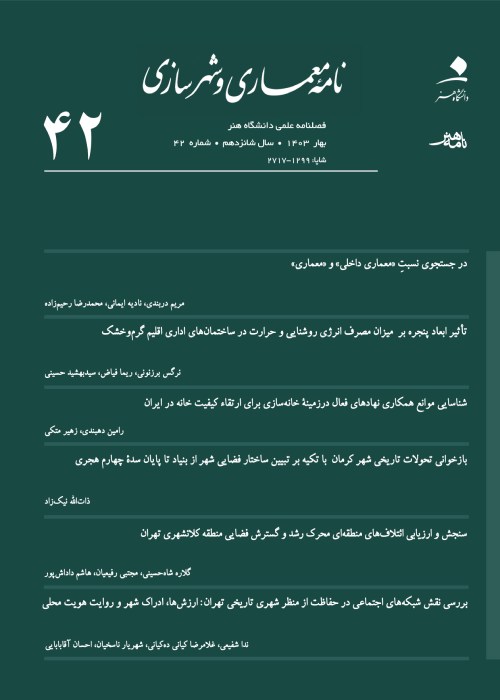Creating Home Space in a Nursery Inspired by a Sense of Place
Case Study: Ameneh Public Nursery Welfare Complex
Author(s):
Abstract:
Unaccompanied children have personal identity problems due to the lack of kindness from their family and friends. Environment of orphanage as a domicile that they have settled is their only comrade. The main problems of them are an identity crisis, isolation, fear, and lack of social relationships and attachment. According to some studies, children’s sense of place has an important role in obtaining personal identity, so creating place attachment in such residential spaces is necessary. The feeling of fixation to this place, due to the role that sense of place plays in the formation of the child identity, is much more important for them than for normal children. In fact, the orphanage is a house of children which they live and are taught there. In discussing about settlements, creating a sense of place and also promoting children’s learning and interaction is required for the formation of their personality. Sense of place is a factor that has a great impact on shaping human identity. An important part of individual’s identity in the society is established in childhood and is based on collective and spatial memories as well as subjective images which underlie many social and personal characteristics such as anxiety reduction, self-esteem achievement and collective and interactive morale. As a result, the concept of sense of place and the factors contributing to creation of the sense, particularly in childhood years, is an important subject which will be discussed in this paper. In this survey, first unaccompanied children are introduces and their problems in the environment of orphanages are studied. To this end, necessity for creating the sense of place to solve some of these problems is perused. Further, sense of place, its factors and the role of each of them in improvement of accommodation spaces of the orphanages are noted. After considering mentioned study, the importance of physical factors, participation in the space designing and active-interactive parameters for developing the atmosphere of orphanage to create sense of place and space of domicile are pointed out. The results of the study suggest a tremendous impact of active and interactive factors in form of play-partnership, on manipulating the place by child himself and his/her contributions to designing and creating spaces and individual territories. Accordingly, proposed solutions are categorized and at the end for the practical testing of the noted factors, Ameneh Integrated Services Welfare Nursery as a sample has been studied. After considering the difficulties and problems, solutions and proposed patterns are presented in three major categories. Also In this case, psychological needs of children to have a safe and warm environment have been ignored and the settlement only provides a roof and shelter for the children. So it performs a review of the spaces and functional relationships at home, trying to offer a model for the design of such spaces.
Keywords:
Orphans , Nursery , Sense of place , Fixation , Home
Language:
Persian
Published:
Journal of Architecture and Urban Planning, Volume:7 Issue: 14, 2015
Page:
97
magiran.com/p1392885
دانلود و مطالعه متن این مقاله با یکی از روشهای زیر امکان پذیر است:
اشتراک شخصی
با عضویت و پرداخت آنلاین حق اشتراک یکساله به مبلغ 1,390,000ريال میتوانید 70 عنوان مطلب دانلود کنید!
اشتراک سازمانی
به کتابخانه دانشگاه یا محل کار خود پیشنهاد کنید تا اشتراک سازمانی این پایگاه را برای دسترسی نامحدود همه کاربران به متن مطالب تهیه نمایند!
توجه!
- حق عضویت دریافتی صرف حمایت از نشریات عضو و نگهداری، تکمیل و توسعه مگیران میشود.
- پرداخت حق اشتراک و دانلود مقالات اجازه بازنشر آن در سایر رسانههای چاپی و دیجیتال را به کاربر نمیدهد.
In order to view content subscription is required
Personal subscription
Subscribe magiran.com for 70 € euros via PayPal and download 70 articles during a year.
Organization subscription
Please contact us to subscribe your university or library for unlimited access!



